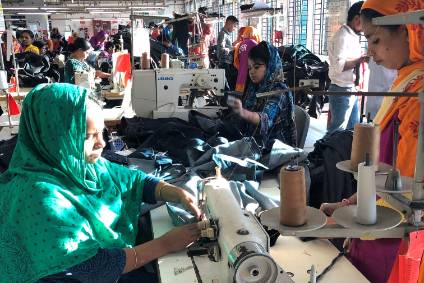
The government of Bangladesh has kickstarted a process to amend its labour law to enable it to continue to benefit from the European Union’s Generalised System of Preferences (GSP) trade scheme.
The EU is one of the largest importers of readymade garments from Bangladesh, and as a Least Developed Country (LDC) Bangladesh enjoys duty-free access to the bloc under the Everything But Arms benefit.
However, the EU regularly monitors GSP beneficiaries to ensure they promote universal values of human rights, core labour standards, environmental protection and good governance.
In its third biennial report on the GSP in February, the European Commission said the EU “intensified the dialogue with Bangladesh, Cambodia and Myanmar to press for concrete actions on and sustainable solutions to serious shortcomings in respecting fundamental human and labour rights.”
It added that with Bangladesh, the engagement focuses on compliance with ILO Conventions. “During an EU monitoring mission in October 2019, the authorities of Bangladesh agreed to develop a roadmap with timelines aiming to improving labour rights, notably the alignment of the Bangladesh Labour Act and the Export Processing Zone Act.”
According to The Financial Express, a 13-member tripartite committee set up by the Bangladesh government will prepare a draft of the amended labour law in line with the “suggested actions on labour rights” provided by the EU to continue the preferential tariff benefits. The draft will then be submitted to the labour secretary by March next year.

US Tariffs are shifting - will you react or anticipate?
Don’t let policy changes catch you off guard. Stay proactive with real-time data and expert analysis.
By GlobalDataThe current GSP regulation will expire on 31 December 2023, with work currently underway on plans for a new GSP. But the EC says fostering sustainable economic, social and environmental development of beneficiary countries, including the respect for good governance and human rights, will remain key.
Bangladesh is also set to graduate from the LDC scheme in 2024. According to local press reports, Bangladesh could stand to lose US$7bn in annual export earnings upon graduation.
Bangladesh’s Ministry of Labour and Employment is said to have sent an action plan to the European Commission in January, covering nine broad issues, including making Bangladesh labour law compliant with International Labour Organization (ILO) standards on freedom of association and collective bargaining, and eliminating child labour in all its forms by 2025 and its worst forms by 2021.
Other issues include combating violence against workers, harassment, unfair labour practices, increasing the success rate of application for trade union registration (paper and online) to a minimum of 90%, and avoiding discretionary refusal of trade union registrations.
Earlier this year the EU partially suspended Cambodia’s eligibility for the EBA programme due to concerns about the country’s human rights records.




